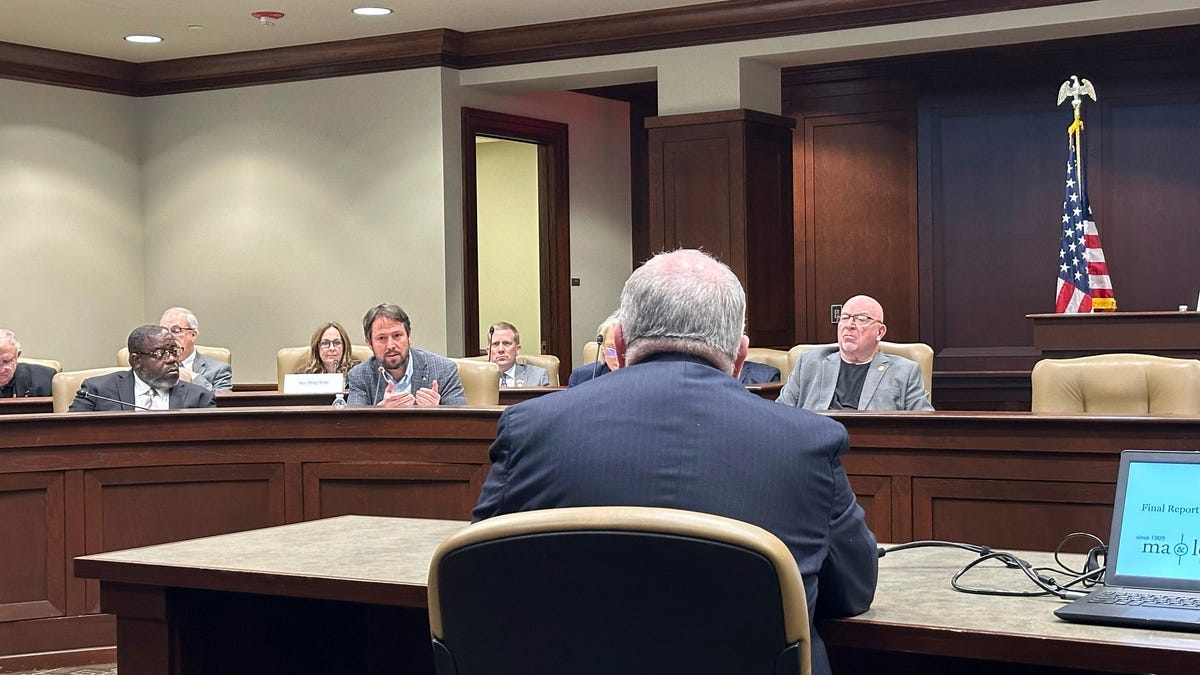Arkansas is expected to host more than 50 prospects, including at least 15 4-star recruits, for the Hogwild Hangout recruiting event Saturday.
The event starts at 11 a.m. and will end around 4 p.m. It is expected to be the last big recruiting event held this summer with the dead period starting Aug. 1 and running until Aug. 31.
Numerous commitments along with prospects from the 2025, 2026, 2027 and 2028 classes are expected to attend.
Class of 2025 Arkansas commitments:
QB Grayson Wilson — 6-3, 205 pounds, of Conway
• Rated a 4-star prospect by Rivals and ESPN, is rated Rivals’ No. 6 dual-threat quarterback
WR Antonio Jordan — 6-6, 230 pounds, of Warren
• Chose Arkansas over Florida State, South Carolina, Ole Miss and others
LB Tavion Wallace — 6-1, 215 pounds, of Jesup (Ga.) Wayne County
• Consensus 4-star prospect, ESPN’s No. 4 inside linebacker
S Taijh Overton — 6-2, 180 pounds, of Mobile (Ala.) Williamson
• Consensus 3-star recruit, had offers from Florida State, Missouri, Ole Miss, Central Florida and others
ATH Quentin Murphy — 6-1, 205 pounds, of LR Parkview
• Consensus 3-star prospect, has other offers from Georgia Tech, Ole Miss, Oregon and Oklahoma
OL Blake Cherry — 6-6, 280 pounds, of Owasso, Okla.
• Consensus 3-star recruit who chose Arkansas over Texas A&M, TCU, Kansas State, Kansas and Nebraska
OL Kash Courtney — 6-5, 270 pounds, of Carthage, Texas
• Consensus 3-star prospect who chose Arkansas over Texas Tech, Houston, West Virginia, Duke and others
CB Nigel Pringle — 6-1, 180 pounds, of Houston North Shore
• On3.com 3-star recruit who had offers from Oregon, Houston, Arizona, Kansas, Arizona State and others
DE Trent Sellers — 6-5, 240 pounds, of Moblie, (Ala.) Faith Academy
• On3.com 3-star prospect with offers from Ole Miss, Nebraska, Mississippi State and others
OL Connor Howes — 6-6, 300 pounds, of Kissimmee (Fla.) Osceola
• On3.com 4-star recruit, No. 14 offensive tackle and No. 150 overall prospect
LB JJ Shelton — 6-1, 205 pounds, of Dallas South Oak Cliff
• Consensus 3-star recruit who had other offers from Ohio State, Auburn, Notre Dame, TCU and others
P Gavin Rush — 6-3, 185 pounds, of Franklin (Tenn.) Page,
• Pledged to Arkansas as a preferred walk-on over scholarship offers from Air Force, Western Kentucky and Army
Non-committed prospects:
’25 CB Aidan Anding — 6-0, 165 pounds, of Ruston, La.
• Consensus 3-star with Arkansas, Texas, LSU and Miami offers
’25 RB Cameron Settles — 6-0, 198 pounds, of LR Parkview
• On3.com 3-star prospect who officially visited Arkansas in June
’25 TE Dakotah Terrell — 6-7, 215 pounds, of Pocola, Okla.
• On3.com 3-star recruit with Arkansas, Oklahoma, Michigan and Texas A&M offers
’25 WR Josiah Warrior-Benson — 6-3, 210 pounds, of Maumelle
• Has an Arkansas State offer
’25 OL Bryson Weathers — 6-6, 285 pounds, of Cabot
• Has interest from Arkansas and Florida State
’26 RB Racine Guillory Jr. — 5-9, 170 pounds, of Aldeo, Texas
• Consensus 4-star prospect with Arkansas, Texas, Southern Cal and Oklahoma offers
’26 RB TJ Hodges — 6-1, 175 pounds, of Marked Tree
• On3.com 4-star prospect with Arkansas, Oregon, Florida State and Ole Miss offers
’26 DE Jordan Harris — 6-6, 220 pounds, of Maumelle
• Has offers from Arkansas, Missouri, Ole Miss and SMU
’26 OL Jahlon Harris — 6-6, 330 pounds, of Maumelle
• Has offers from Missouri and Arkansas State
’26 Noah Best — 6-3, 290 pounds, of Midlothian, Texas
• ESPN 3-star prospect with Arkansas, Missouri, LSU and Oklahoma offers
’26 DB Lebron Bauer — 5-11, 160 pounds, of Allen, Texas
• Arkansas, Texas Tech and Arizona State offers
’26 S Jordan Deck — 6-2, 185 pounds, of Frisco, (Texas) Lone Star
• 247Sports 4-star prospect with Arkansas, Penn State, LSU and Oklahoma offers
’26 QB Jayvon Gilmore — 6-6, 190 pounds, of Elgin, (S.C.) Gaffney
• On3.com 3-star with top five of Arkansas, Virginia Tech, Louisville, Texas A&M and N.C. State
’26 TE Landon Pace — 6-3, 230 pounds, of St. Louis University HS
• Son of former Ohio State and NFL offensive lineman Orlando Pace
’26 DL Anthony Kennedy — 6-6, 280 pounds, of Maumelle
• ESPN 4-star with Arkansas, Georgia, Auburn, Tennessee and Texas A&M offers
’26 WR Caleb ‘The Jet’ Smith — 5-10, 160 pounds, of Allen, Texas
• On3.com 3-star recruit with Arkansas, Nebraska, Louisville and Baylor offers
’26 OL Cody Taylor — 6-3, 280 pounds, of Greenwood
• On3.com 3-star recruit with Ole Miss, Vanderbilt, Kentucky and Virginia Tech offers
’26 DE Colton Yarbrough — 6-5, 240 pounds, of Durant, Okla.
• 247Sports 4-star prospect with Arkansas, Oklahoma St., Oregon and Georgia offers
’26 OL Desmond Green — 6-5, 350 pounds, of St. Stephen, (S.C.) Timberland
• Rivals 4-star recruit with South Carolina, Georgia, Clemson and Florida offers
’26 OL Blaise Thomassie — 6-5, 270 pounds, of Baton Rouge, (La.) Catholic
• Rivals 4-star recruit with Arkansas, Oregon and Florida State offers
’26 OL Bryce Gilmore — 6-4, 270 pounds, of Prosper, Texas
• Rated a 4-star by three of four recruiting services and has Arkansas, Nebraska and California offers
’26 OL Deminio Patterson — 6-4, 320 pounds, of Joe T. Robinson
• Has an offer from Ole Miss
’26 OL Tucker Young — 6-5, 300 pounds, of Hot Springs Lakeside
• Has offers from Arkansas and Memphis
’26 DB Adam Auston — 6-2, 200 pounds, Lawton, (Okla.) MacArthur
• On3.com 3-star recruit with Arkansas, Oklahoma State, Kansas State and Baylor offers
’26 WR Tre’von McGory — 6-0, 175 pounds, of Germantown, Tenn.
• On3.com 3-star prospect with Arkansas, Auburn, Tennessee and Missouri offers
’26 WR Blair Irvin III — 6-1, 170 pounds, of Bentonville
• Kansas State, Minnesota and UNLV offers
’26 WR Dequane Prevo — 5-9, 160 pounds, of Texarkana, (Texas) Liberty-Eylau
• ESPN 4-star prospect with Arkansas, Texas, Texas A&M and Oklahoma offers
’26 QB Jackson Presley — 6-2, 190 pounds, of Kalispell, (MT.) Glacier
• On3.com 3-star recruit with Arkansas, Texas A&M, Florida State and Colorado offers
’26 DB Caden Harris — 6-0, 165 pounds, of Brownsville, (Tenn.) Haywood
• On3.com 4-star with Arkansas, Tennessee, Ole Miss and Alabama offers
’26 LB Jakore Smith — 6-1, 190 pounds, of LR Parkview
• 247Sports 4-star recruit with Arkansas, Tennessee, Alabama and Ole Miss offers
’26 Tylen Mathews — 6-0, 170 pounds, of Lake Cormorant, Miss.
• On3.com 3-star recruit with Arkansas, Ole Miss, Tennessee and Auburn offers
’26 S Kyndrick Williams — 6-1,185 pounds, of Fayetteville
• Has an offer from UNLV
’26 WR Blake McLane — 6-3, 190 pounds, of McKinney, (Texas) Frisco Emerson
• Attended an Arkansas camp in June
’27 LB/DE Ba’Roc Willis — 6-2, 220 pounds, of Moody, Ala.
• Has offers from Arkansas, Alabama, Auburn and Florida State
’27 DB Jayden Anding — 6-0, 165 pounds, of Ruston, La.
• Has offers from Arkansas and Miami and is the brother of Arkansas ’26 DB target Aidan Anding
’27 DE-TE Hayden Sublette — 6-4, 220 pounds, of Maumelle
• Earned an offer from Arkansas after attending camp in June
’28 WR David Thomas — 5-11, 160 pounds, of Stillwater, Okla.
• Has offers from Arkansas and Oklahoma State















/cdn.vox-cdn.com/uploads/chorus_asset/file/25547838/YAKZA_3840_2160_A_Elogo.jpg)


















